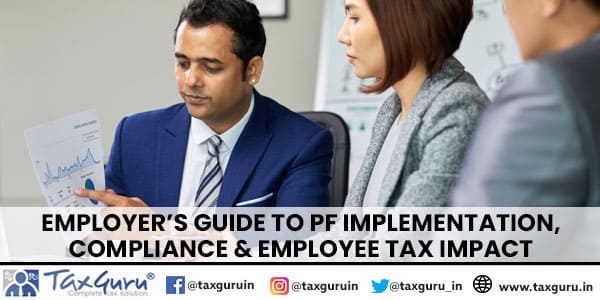A Comprehensive Guide to Employer for Provident Fund (PF) Implementation & Compliance along with employee’s taxation impact by PF
Introduction:
The Employees’ Provident Fund (EPF) is a crucial aspect for compliance with the law for employer and to give the benefit of long term investment & taxation benefit to employees to retain & motivate them.
For employee’s perspective it is very crucial for long term financial planning and to reap taxation benefits on PF. Understanding its applicability, contribution rules, taxation, and investment benefits is essential for seamless implementation and compliance. In this guide, we delve into the basics of PF, its necessity, compliance requirements for employers, taxation benefits for employees, and provide insights into PF investments.
1. PF Applicability & Basics:
EPF is applicable to organizations with 20 or more employees.
Employer and employee contribute 12% each of the employee’s EPF wages, with 8.33% of the employer’s contribution going to the Employee Pension Scheme (EPS) and remaining to EPF i.e. 3.67% and employees portion of total 12% goes to EPF contribution.
EPF wages are calculated as Gross Salary minus HRA and certain allowances.

2. Applicability on Employees:
EPF is mandatory for employees with a gross salary (including HRA) up to Rs. 15,000.
Employees with gross salaries exceeding Rs. 15,000 can opt-out if they haven’t previously opted for PF or having their first job.
3. EPF Contribution and EDLI Contribution i.e. cost to employer:
Employers contribute 12% of Rs. 15,000 towards EPF, with an option for voluntary contributions. Employer’s liability is maximum of 1800 (12% of Rs. 15,000), If employee/employer need to opt for higher PF contribution, both must be agreed for this.
EDLI (Employee Deposit Linked Insurance) contributions of 0.50% must be capped at Rs. 15,000 salary, regardless of PF wages.
In addition to the EPF/EPS contribution, employer have to borne the admin charges i.e. PF Admin charges 0.50% of PF wages.
4. EPF Withdrawal Rules:
100% EPF can be withdrawn upon reaching the age of 58, unemployment for two months or more, or in case of premature death.
Partial withdrawals are permitted for specific scenarios like education, medical emergencies, etc. up to certain percentage of EPF amount by meeting specific conditions with respect to each scenario.
5. Investment:
It is one of safest mode of long term investment & retirement savings/planning along with tax effectiveness. EPF interest rate is reviewed annually and was 8.15% for FY 2022-23. EPF interest is compounded annually. EPS (Employee Pension Scheme) contributions do not earn interest but provide a pension after age 58.
6. Taxation of PF/EPF:
EPF is EEE model investment that is exempt at the time of investment, interest and maturity. However, certain scenarios may impact the employee’s tax liability which is summarized below:
- Interest earned on EPF is taxable if the account is inoperative, based on the member’s slab rate.
- Interest on EPF exceeding Rs. 2.5 lakhs (or Rs. 5 lakhs if the employer hasn’t deposited) is taxable from FY 21-22.
- Employer’s EPF contribution exceeding Rs. 7.5 lakhs per annum is taxable in hands of the employee from FY 20-21.
Summary:
Understanding PF is essential for employers and employees alike. Employers must ensure compliance with PF regulations while employees can benefit from tax advantages and long-term savings through PF investments. With proper understanding and adherence to PF norms, both parties can secure their financial futures effectively.
*****
About the Author: Author is Modhu Khyalia (www.linkedin.com/in/camodhukhyalia), Founder of R Modhu & Co. (https://in.linkedin.com/company/rmodhuandco), a CA firm committed to delivering excellence in tax optimization, accounting, and business advisory services. A member of the Institute of Chartered Accountants of India (ICAI) since 2015, Modhu Khyalia is a reputed Chartered Accountant who has over 8 years of extensive experience in the financial landscape. Modhu Khyalia, is a strategic advisor in the realms of tax and statutory compliance. His comprehensive advisory services cover a spectrum including GST, Income Tax, TDS, Corporate Tax, Foreign Taxation, PF, ESI, Implementation of ERP and designing various types of management reports for better decision making and more.
Kindly Refer to Privacy Policy & Complete Terms of Use and Disclaimer.






This is a very informative article. I have aquestion though. My company allows me to structure components of my salary ( Basic, Allowance, HRA etc) . I want to know if I keep my Basic high, then the employer contribution to EPF will also increase. I understand that it will reduce my in-hand salary, but wont it benefit me , as I will be getting more money from my company in form of additional EPF employer contribution ?